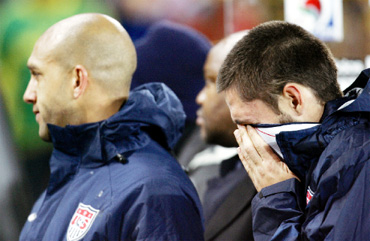
The United States’ Confederations Cup adventure generated a wide variety of reactions in America: pride in a strong effort, disappointment at letting a trophy slip away and, understandably, puzzlement. After all, not many squads can look awful against Brazil one week then nearly beat them the next. “Which team will show up during the rest of World Cup qualifying, as well as in South Africa next summer?” wrote ESPN’s Jeff Carlisle. “Will it be the side that struggled early during the tournament or the one that finished with a flourish, even in losing a heartbreaking final to Brazil?”
A likely answer is: both. Instead of fretting over the US’s baffling form, however, we should revel in it. The traditional soccer narrative of the United States, dating to the 1970s, highlights the country’s supposedly enormous potential. But rather than waiting another few decades for the US to become a power, why not embrace its unpredictable, quirky side?
True, the current edition of this team is infuriatingly inconsistent. But at least it’s a marvel of inconsistency. Whereas Mexico always lose in the second round of the World Cup – yawn – the United States’ sheer unpredictability makes the team worth following. In June alone, Team USA was routed by Costa Rica in World Cup qualifying, then confidently snapped Spain’s three-year unbeaten run.
While all teams have peaks and valleys over time, the US frequently packs them into 90 minutes. Consider the World Cup campaign. In El Salvador in March, the US played a horrible 75 minutes to fall behind 2-0, before a frantic rally produced two late goals and further untaken chances. At home to Honduras in June, the US fell behind within five minutes before scratching out a victory – an uneven performance personified by Carlos Bocanegra, who headed in the winner, then immediately got taken off with an injury after the restart. With these guys, good and bad are intertwined.
Impressively, the United States can produce these trademark half-good, half-dismal efforts against anyone. And they don’t always involve late rallies. Against Brazil and Italy in the Confederations Cup, fast starts and half-time leads were followed by three-goal second-half meltdowns. The excitement of sport comes from its uncertainty, does it not?
As a bonus, Team USA routinely makes blowhard pundits look silly. “We have raised a generation of boys as opposed to men in US soccer,” said Alexi Lalas after the slow start in the Confederations Cup. The national team then promptly rolled into the final. And while Lalas and fellow TV commentator John Harkes spew out ever-shifting prescriptions for coach Bob Bradley – better attitude, more domestic players, more steel in midfield – the reality is that no one knows how the team will perform at any time. As Tim Howard said after the 3-0 win over Egypt: “We are scratching our heads just like you guys.” Who needs experts? This team calls into question the whole premise of expertise.
Ultimately, it’s futile to extract lessons about the national team’s long-term future from every match. The future is already here, and the US has firmly established itself. Not as a world power, but as one of those rare national teams – think Portugal or Nigeria – whose mystifying form is itself an attraction. Granted, this is not what many American fans desire most, given their expectations of sporting dominance. But for some of us, it’s a welcome state of affairs.
Peter Dizikes in (the British) When Saturday Comes.
